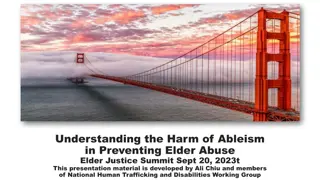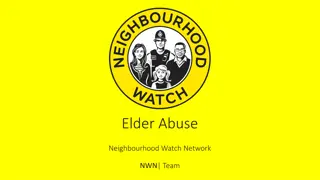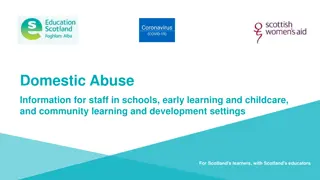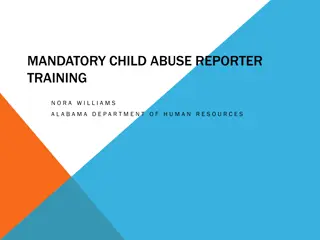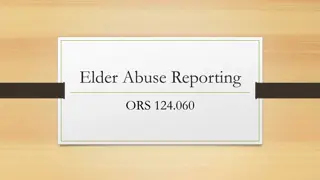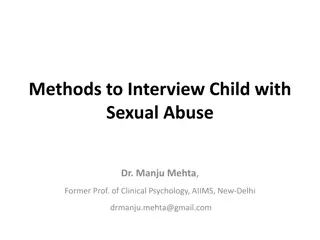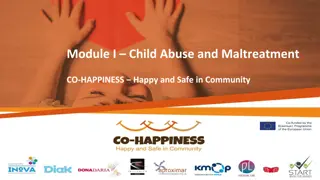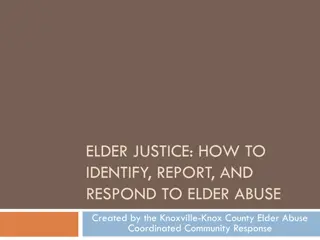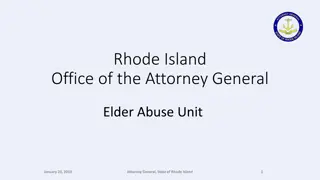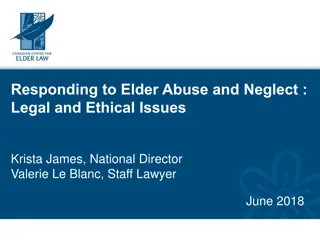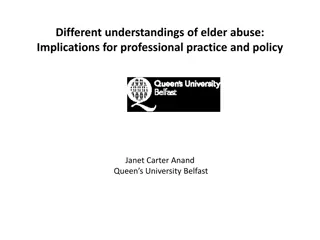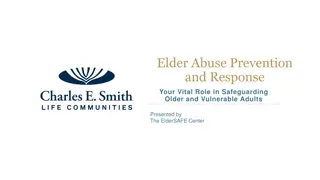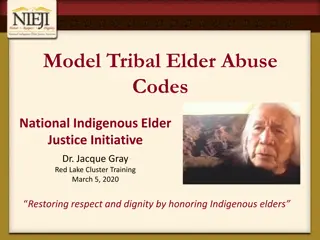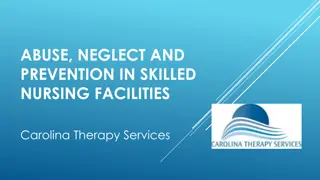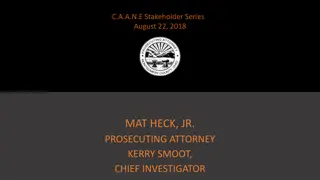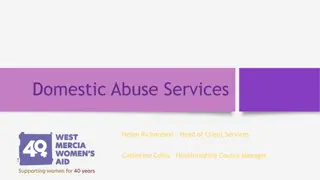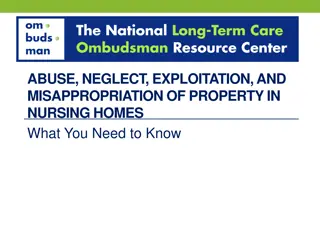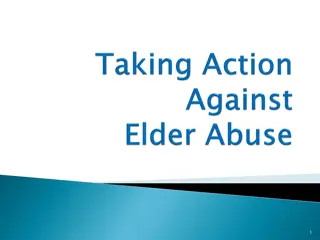Understanding Elder Abuse: Types and Signs
Elder abuse is a serious issue that includes physical, emotional, financial, and neglectful mistreatment of individuals aged 60 and above. Recognizing the signs of elder abuse is essential for prevention and intervention. The Elder Rights Project aims to provide free legal services to victims of elder abuse to ensure their safety and well-being.
Download Presentation

Please find below an Image/Link to download the presentation.
The content on the website is provided AS IS for your information and personal use only. It may not be sold, licensed, or shared on other websites without obtaining consent from the author. Download presentation by click this link. If you encounter any issues during the download, it is possible that the publisher has removed the file from their server.
E N D
Presentation Transcript
Legal Action partnered with Judicare to expand the Elder Rights Project statewide. The Elder Rights Project provides free civil legal service to victims of elder abuse Our mission is to assist in securing safety, stability, and independence for victims.
An elder abuse victim is a person age 60+ who has experienced or is currently experiencing physical abuse, emotional abuse, sexual abuse, neglect, financial exploitation, treatment without consent, or unreasonable confinement or restraint. Wis. Stat. 46.90.
What is Elder Abuse? Physical or Sexual Abuse Emotional Abuse Financial Abuse or Exploitation Neglect
Physical or Sexual Abuse The intentional or reckless infliction of physical pain or injury, illness, or any impairment of physical condition. 1stto 4thdegree sexual assault, as defined in Wis. Stat. 940.225
Financial Exploitation Obtaining (or receiving for less than FMV) a person s money, property, or belongings by deception, enticement, coercion, or force Abuse of financial authority (especially by a fiscal agent under POA-F, GOE, etc.) Identity theft, unauthorized use of personal information or documents Forgery
Emotional Abuse Language or behavior that serves no legitimate purpose and is intended to be intimidating, humiliating, threatening, frightening, or otherwise harassing, and that does or reasonably could intimidate, humiliate, threaten, or otherwise harass the individual to whom the conduct or language is directed.
Neglect Failure of a caregiver to endeavor to secure or maintain adequate care, services, or supervision for an individual, AND Creating significant risk or danger to the individual s physical or mental health
Treatment without Consent and Unreasonable Confinement or Restraint Treatment without Consent Administration of medication without informed consent Unreasonable confinement or restraint Intentional and unreasonable confinement of an individual in a locked room Use on an individual of physical restraining devices Provision of unnecessary or excessive medication
Signs of Physical Abuse Physical injuries, especially unexplained or repeat injuries Untreated injuries or medical conditions Dehydration, malnourishment Poor physical condition
Signs of Financial Exploitation Disappearance of financial/legal docs or checkbooks Basic needs being unmet Unpaid bills Unusual banking activity Provision of unnecessary services Sudden or unexplained transfers of property/assets Letters from the lottery
Emotional or Behavioral Signs of Abuse Strained or tense relationships Changes in personality or behavior Withdrawn Isolation
Who are the abusers? 14.90% Family Members Friends or Neighbors 16.90% Home Care Aides 57.90%
The Elder Rights Project helps abuse victims: become safe and independent stabilize their lives meet their emotional and physical needs by resolving their critical civil legal problems
Elder Rights Project clients must be: Wisconsin residents Age 60 or older Victims of crime (elder abuse) Facing civil legal needs related to victimization
Victims of elder abuse do not need to be low income to qualify for services. There are no income or asset limitations.
To qualify, an Elder Rights Project client must be the victim of a crime: Crime can be self-reported by the victim. No charges, convictions or law enforcement report required.
The Elder Rights Project is funded by VOCA. The Victims of Crime Act was enacted in 1984. The Act created the Office for Victims of Crime, which administers the Crime Victims Fund. The Fund is financed by fines and penalties paid by convicted federal offenders, not from tax dollars.
Elder abuse victims commonly need representation when: Obtaining domestic abuse injunctions, individual- at-risk injunctions and other types of protection orders. Launching eviction proceedings to remove abusers from their homes
Defending themselves in eviction proceedings if the eviction is related to abuse or neglect. Seeking review of an abuser s conduct who has been granted power of attorney, and revoking that POA if needed.
Defending against foreclosure resulting from predatory lending, or where the missed payments were due to financial abuse. Recovering from ID Theft, including: Removing unauthorized charges from accounts Placing fraud alerts Blocking fraudulent debts from credit reports Defending debt collection lawsuits.
Seeking benefit check-ups and assistance obtaining public benefits needed as a result of the abuse. Filing small and large claim civil actions for the return of money and property, including real property, wrongfully taken from the senior.
The Elder Rights Project welcomes referrals! Professionals can refer clients by using the referral form provided by Legal Action. Potential clients can also call our statewide toll- free Elder Abuse Intake Line at (844) 614-5468.
Send completed referral to the appropriate agency, depending on client s location: Jolene Umentum Paralegal at Elder Rights Project Fax #: 920-432-5078 jju@legalaction.org Wisconsin Judicare, Inc. Elder Rights Project Fax #: 715-848-1885 info@judicare.org Counties: Adams, Brown, Buffalo, Calumet, Columbia, Crawford, Dane, Dodge, Door, Fond Du Lac, Grant, Green, Green Lake, Iowa, Jackson, Jefferson, Juneau, Kenosha, Kewaunee, La Crosse, Lafayette, Manitowoc, Marquette, Milwaukee, Monroe, Outagamie, Ozaukee, Racine, Richland, Rock, Sauk, Sheboygan, Trempealeau, Vernon, Walworth, Washington, Waukesha, Waushara, and Winnebago Counties: Ashland, Barron, Bayfield, Burnett, Chippewa, Clark, Douglas, Dunn, Eau Claire, Florence, Forest, Iron, Langlade, Lincoln, Marathon, Marinette, Menominee, Oconto, Oneida, Pepin, Pierce, Polk, Portage, Rusk, St. Croix, Sawyer, Shawano, Taylor, Vilas, Washburn, Waupaca, and Wood Tribes: Bad River Tribe, Redcliff Tribe, Lac du Flambeau Tribe, Ho- Chunk Nation, Oneida Nation, Lac Court Oreilles Tribe, Stockbridge - Munsee Nation, Sokaogon Chippewa Tribe, Forest County Potawatomi Tribe, St. Croix Tribe, and Menominee Tribe
Contact Information for Wisconsin Judicare Attorney Aimee McGinty Attorney Will Baynard Wisconsin Judicare, Inc. 401 N. 5thSt., #200 P.O. Box 6100 Wausau, WI 54402-6100 800-472-1638 Clients: For legal help, call 844-614-5468, & reference the Elder Rights Project (or ERP).
Contact Information for Legal Action: Jolene Umentum Elder Rights Project Paralegal Legal Action of Wisconsin (920) 432-4645 jju@legalaction.org
Additional Resources Adult Protective Services (APS): https://www.dhs.wisconsin.gov/aps/ Elder Adults-at-Risk Help Lines in every county: https://www.dhs.wisconsin.gov/aps/ear-agencies.htm If you or someone you know is in immediate danger, call 911!


